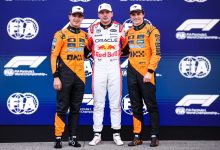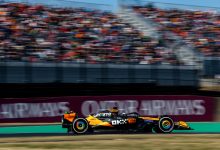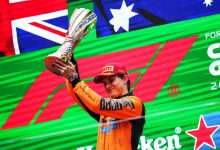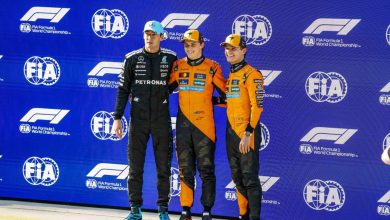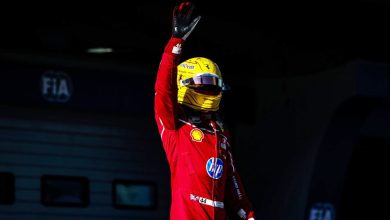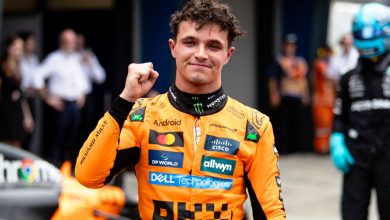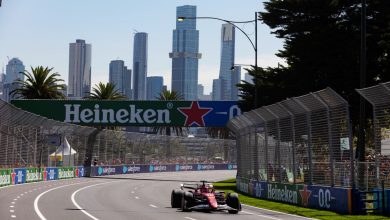Marcin Budkowski issue rocks FIA press conference
PART ONE: TEAM REPRESENTATIVES – Cyril ABITEBOUL (Renault), James ALLISON (Mercedes), Mattia BINOTTO (Ferrari)
PRESS CONFERENCE
Cyril, there’s been a lot of speculation regarding the future of Marcin Budkowski. Now, you have announced today that he is joining Renault. Could you elaborate a little bit on what he is going to be going for the team and how you came to get hold of him in the first place?
Cyril ABITEBOUL: Well, indeed, as you say the speculation and the rumour is part of the explanation of why we decided to make it official. We didn’t feel it was good actually to have any sort of ambiguity for any of the parties involved. It’s clear, and we appreciate, that it’s a sensitive topic for lots of parties, but it was important I think to present our side of the story. Marcin is coming in a non-technical capacity. He’s coming in a senior position into the team. I think it is a great career development for him. It’s something that he is doing because it makes sense in his career. As far as we are concerned, since we came back we are still building our team, building our structure. We tried something with Frédéric Vasseur last year, which, I mean it’s no secret, unfortunately did not work out, but Fred has now found a fantastic position with Sauber but there was still a gap and a position to be filled. Simply there is a lot to be done. Renault Sport Racing is involved in many different categories, Formula One but also Formula E, we are based on two sites, one in the UK and one in France, responsible for chassis and engine, supplying engines to lots of great teams with big expectations. So simply lots to do and I just needed some help and someone I can trust and that can work alongside me particularly on the development of the Enstone team.
Can you just remind us, when will he be starting with the team?
CA: Again, there has been lots of talk about that, not from us. We always made it clear that we would not want to be aggressive in relation to that. From a contractual perspective he could be available from early next year, but we have had a constructive discussion with the FIA and I believe that we are close to reaching an agreement on a start date that would I say make everyone comfortable. I think that is a date of early April, which is basically twice his gardening leave provision has been discussed, has been invoked. Nothing has been confirmed yet but that is something we are completely prepared to entertain as far as we are concerned.
If we look back to the Malaysian Grand Prix last weekend. It was a great victory for your engine. What does that win say about your power unit, and can you tell us a little about the development plans for next year? Is there going to be a qualifying mode, for example?
CA: Yes, I think it says that we are catching up progressively. We are not quite there at the level of the two gentlemen on my left and right, in particular. I think the Renault powerplant is actually becoming very decent in race operation, but indeed we are definitely missing something in qualifying. Obviously it’s always a balance running safe and being aggressive and obviously the more potential performance we have then the more capacity we will have to be aggressive on Saturdays. This is typically what’s on plan for next year, even though we believe also that the regulation will help us in bridging any sort of deficit in relation to that on Saturday. So it’s positive and I think it’s something that McLaren could also see and part of the decision of working with us for the next three years.
James, the last couple of races haven’t been the easiest for the team. I was just wondering if you could shed some light on those performances and how confident are you of running a little bit better this weekend at Suzuka?
James ALLISON: Well, they’re two weekends that showed that it’s sometimes better to be lucky than good. Nevertheless, if you look at the season as a whole, it has been divided into three types of experience. There have been a few races where we have come out and crushed everything in front of us. There have been a few where we’ve had the other end of that deal, where we have definitely come off second best. And then a whole lot in the middle where it has been pretty much a 50/50 slugging match. The last two were in the category where we got beaten for pace. We’re hopeful from what we’ve seen so far this weekend that this one will not fall into that category, and that we will be putting up a decent fight of it, and I suspect that it will fall into the slugging match category that most of this season has been so thrilling to be part of for.
Where is the focus at the factory at the moment. The Constructors’ Championship looks pretty nailed on, so are you allowing yourself the luxury of focusing on next year back in Brackley?
JA: Well, I wouldn’t agree with you about the nailing business, but the truth of it is that every single team, every single year faces the dilemma of how they ramp down their efforts on the car that races and how they ramp up their efforts on the car that will race next year. Every single one of us, the teams that is, will be transferring a substantial amount of resource onto next year’s car, because they couldn’t fail but to do that. But there is still an amount of residual resource, more than residual, going into this one to make sure that those developments keep coming until later in the season.
Thank you James. Mattia, the last few races for Ferrari have been something of what if. I was just wondering, with reference to Malaysia in particular, if you could shed any light on the reliability problems you had there and how confident you are that you have solved those coming into the Japanese Grand Prix?
Mattia BINOTTO: You can never be fully confident of solving the problems you have got. It’s true that the problems we had were completely unexpected; there are problems that we did not experience both at the dyno or at the race track during the entire season. There were some quality issues with the parts. We failed an inlet manifold of the engine, from the compressor to the cylinder heads, and it happened twice, because we had the same problem with Sebastian in qualifying and Kimi in the race. Obviously it happened twice in Malaysia, in an entire season, so certainly some boundary conditions have affected the overall reliability. This is something that we are analysing. Obviously in parallel we reinforce the components, but it’s something which we still need to better understand.
The last couple of race we haven’t been able to see what your cars have been capable of, but fastest in practice in Suzuka this morning. How do you assess the pecking order now in Formula One? Do you think you have the fastest car?
MB: I think qualifying is the best way, somehow, to evaluate it. We had the pole in Singapore, true, but we were not on pole in Malaysia. So I think we have progressed, we progressed through the season. I think for us battling for the pole, or being on pole was more difficult at the start of the season compared to today. Overall our package has improved but it’s never enough. Being fast is not sufficient. What counts is finally winning the race.
QUESTIONS FROM THE FLOOR
Q: (Dieter Rencken – Racing Lines) Cyril, regarding Marcin Budkowksi, do we understand that he will reporting directly to you and then people like Bob Bell and Rob White will be reporting to Marcin. Is that the structure that you envisage?
CA: Yeah, that’s correct. The official position as announced today is Executive Director, so he will be sort of my right-hand man in Enstone, a place where I am not enough, given all the travelling and in particular the long seasons. So Marcin will be factory-based and Bob Bell, Nick Chester and Rob White will all together report to him.
Q: (Dieter Rencken – Racing Lines) Mattia, Sergio Marchionne was quoted on Monday as saying that it was unacceptable what had happened in the previous two races and that changes would have to be made. When this was put to Sebastian yesterday, he said he thought that there were some changes coming but they had nothing to do with that. Could you elaborate on that? What sorts of changes are envisaged that if a driver knows about them, they must have been announced internally already?
MB: I think that to improve your performance you need to improve your car and your package but as well you need to improve your organisation. What we are considering is something, already planned, is to improve our quality department. Our quality department will be and somehow is already reinforced and those are the changes that our chairman was meaning.
Q: (Jens Nagler – Bild) James, Lewis referred to the car as being a bit like him – great potential, but doesn’t always do what it has to do. Is the car a kind of a diva or is it, in the end, understandable, what it does?
JA: It is difficult but it doesn’t disobey the laws of physics. It is clearly understandable but that doesn’t mean it’s always easy to get the best from it. It’s been a challenge this year to achieve the results we have with, but nevertheless we have achieved some pretty decent outcomes with it, so it’s not been a bad machine for us. However, we would like a car that is easier to throw at the race track and easier to guarantee that every time we come racing we get every last little bit from it. Such changes as we have been able to make this year we have and we hope that next year we make something with a slightly sweeter temperament.
Q: (Dan Knutson – Auto Action and Speedsport) To all three of you: going into this year there were a lot of unknowns, so it was difficult to design the cars. Going into next year, with all the new information, is it going to be easier to design them or even harder because you have so much information about the new regulations?
MB: F1 is always a challenge, the difficulty is always there, whatever you are facing. We face a certain because of new regulations and now we’ll face a different difficulty because we need to improve our car. I don’t think there is ever a moment where you can relax. The difficult is simply that one. It is true that there will be a continuity of regulations but it’s also true that we need to improve as much as we can.
CA: It’s always a challenge. It’s a competition, so you need to be better than the others, and to develop quicker, in particular if you are sitting behind, so that’s a challenge. Plus, you have also, even though there is not such big changes as this year in regulations, you still have a couple of changes. There will be the introduction of the Halo, some variation to the suspension regulation, which will make things slightly difficult. The sensitivity of car to weight will be much greater next year than this year so it’s going to be a different type of challenge, but still a challenge.
JA: I think I’d just say that while last year was more a blank sheet of paper and therefore you had more design choices to make, that was true for everybody. And we go, all of us teams, with a lot more information about how these cars behave and therefore with clearer ideas of what we would like to do for the next season. But that’s true for everybody and therefore everyone will be better guided and the overall level of difficulty in making sure that you’re the quickest will remain the same. The new challenge of refining your current weapon will be the same for everyone.
Q: (Dieter Rencken – Racing Lines) Cyril, returning to the Marcin Budkowski question, could you elaborate, just for the avoidance of any doubt, could you elaborate please on whether he resigned because you’d recruited him or whether you recruited him because he’d resigned from the governing body?
CA: I don’t want to enter into a… I don’t think we have any obligation to disclose that type of process that is an individual process. You may have encountered in your career some persons, so you know it’s always an opportunity that is coming from both ways. I think there was some feeling that Marcin wanted to do a career progression, moving also away from a pure technical role in which he is currently, for something which is a wider management responsibility, which is something we had on offer. So, it’s, as always, when demand and offer is meeting somewhere, and that has simply happened in the last couple of weeks and something that we have now made clear.
Q: (Jens Nagler – Bild) Question to Monsieur Abiteboul, the Budkowski deal, did you understand the discussion coming up about the deal or do you say ‘OK, everybody have the chance to make an approach to him’?
CA: I’m not totally sure of the question. If the question is whether we wanted to be extremely aggressive on notice period, on gardening leave provision, is that correct?
Can you understand that some of your competitors said it’s not correct?
CA: No. Well, first, it’s word that has been reported. I’m not sure that everyone is actually thinking that. Approaching people is unfortunately a part of Formula One, it’s also part of why Formula One is competitive and you have a level playing field and you have an interesting show and races. We always talk about the distortion created by disparity of resources – but you also need to have some freedom of people within the organisations such that the racing is interesting. That’s the first comment I would make. The second comment is yes, I understand – but again, when you recruit someone it is not a short-term opportunity. All the designs of next year’s car are already frozen. We are in the process of manufacturing moulds, suspension geometry, all of that is already decided since months. It is not something that is going to influence, and things will again start from scratch for 2019. These gentleman on my left and my right will know that there is limited influence someone like that can make to a car, and because of the obsolescence of information in Formula One, it’s not going to make a huge difference. We are taking that person because he has the skills, he has the experience of Formula One this is required for our programme and our project, which is to become a top team by 2020, full stop. It’s not for what he knows today.
Q: (Marco Mensurati – La Repubblica) To Mattia and James. I just would like to know what you think about that? What is your opinion? Are you fine with that or not?
JA: Erm… well… the relationship the teams have with the FIA is always… it relies on certain things. It relies on the teams being able to be candid with the FIA and have absolute confidence that anything that is discussed with the FIA remains completely confidential. Those things have always been true about the relationship we have with the FIA and always will be. The main foundations of our relationship, the teams’ relationship to the FIA, are built on that, and those things are strong, and always will be. If an FIA employee leaves and re-joins a team, then you would wish, I think, to have somewhat longer notice period than three months. I think everyone, on FIA side and teams’ side would say that but… this isn’t the situation today and I guess we’ll all just swallow and get on with it. But the actual building blocks of what makes the relationship between teams and FIA good is what I described – and that always has been strong, always will be strong.
Mattia?
MB: There is not much I can add. Certainly, it’s a delicate matter. Certainly, all the people involved in that situation feels uncomfortable, and I’m sure it will be discussed at a different level still.
Cyril has said that it’s a start date of April next year. Are you satisfied with that, James? Mattia?
JA: Well, it is whatever it contractually is. So, there’s not much point in talking about it.
Q: (Gaëtan Vigneron – RTBF) Question for James. You have worked with Fernando, with Sebastian, with Lewis. If you had to point out the big difference between them or who was the most impressive one for you?
JA: I get asked this question a lot and it’s a frustrating question because, first of all, there’s an impossibility of answering it because there’s only one way to know for sure and it’s to line them all up in exactly the same equipment on the same days and have a championship where you find out exactly. All I can tell you is that all three of them have got the victories and the achievements that they have, not by good fortune but by being brilliantly skilful racing drivers. I would add to that, that it has been a considerable pleasure joining Mercedes this year for many, many reasons but one of those was that it was my first opportunity to start working alongside Lewis. I think I’d only ever said hello to him once in all the years prior to that and the experience of working with him is very different to what I imagined it would be and I’ve found a racing driver or the sort of excellence that all of us can see from his statistics and the way he goes about his job but what has been particularly good is that I’ve found a guy that conducts himself as a man in a way that makes you happy to work alongside him. And that’s been an enjoyable and good thing about joining Mercedes.
Q: (Dieter Rencken – Racing Lines) Cyril, still on the question of recruitment but this time about Carlos Sainz. Could you try and elaborate on the reasons why you have chosen to recruit a driver in the knowledge that you’ll lose him after a year. Or certainly the indications in the statements indicate that you lose him after a single year. What sort of benefit is that to the team?
CA: First and foremost, we have to accept the fact we are, y’know, arriving a bit late to the part as Renault. We only entered back into Formula One as a manufacture team 18 months ago and we are arriving at a point where a lot of drivers are in the middle of their contracts. There are basically cycles for a number of contracts. You know that was something we had to acknowledge and take into account into our planning for drivers. It looks like there will be lots of things that will be up for renewal in the course of next year, for 2019. We sort-of feel that we should be part of those discussions next year and therefore having a driver for one year is a concession, in particular on a loan is a concession, but we feel it is an acceptable concession. It’s going to allow us to make a step forward, just like Nico Hülkenberg allowed us to do one step forward this year. It’s going to be another step forward for next year before many making maybe another step in 2019.
PART TWO: TEAM REPRESENTATIVES – Yusuke HASEGAWA (Honda), Ayao KOMATSU (Haas), Paddy LOWE (Williams)
Q: Hasegawa-san, if we could start with you please. It’s been a good couple of races for McLaren-Honda, particularly Stoffel Vandoorne, seventh in both of the last two races. Just wondering how much satisfaction have those results given you and how confident are you of another good result on home turf this weekend?
Yusuke HASEGAWA: Obviously in Singapore and Malaysia we got points which were very good but of course we are not satisfied. We are aiming higher all the time but we feel kind-of relieved to get a decent step. So, of course we try to keep the same performance for here, in Suzuka.
Q: What can you hope for this weekend?
YH: So far, that we get some points.
Q: And with regard to next year, let’s just talk a little bit about the relationship with Toro Rosso. How do you think that relationship might differ to the one that you’ve had with McLaren?
YH: I don’t think it’s a huge difference. We have already started the preparation for next year. They are very kind and they are very excited to have a new partnership, which we, of course, are feeling the same thing. No, there’s not a big difference, just a new partner.
Q: Is the commercial relationship going to be the same as it was with McLaren?
YH: Of course, the McLaren-Honda, the name of the McLaren-Honda is very famous – in Japan at least, maybe in other countries. From that point of view it could be that the expectation from the audience is a bit less, so we need to show that we can make it better. From that point of view, maybe I will feel a bit less pressure from the outside but from the inside there is no difference. We need to prove that we can do a better job for next year.
Q: Ayao, second season of the Haas Formula One team, what is your perspective on how it’s gone? How would you sum up the last 18 months with Haas? How’s it gone?
Ayao KOMATSU: It’s going well. Of course it could be better but from last year to this year we made a very big improvement and even though it may not be obvious to everyone but consistency is better than last year and our understanding is better, but I think now that we made a step from last year we now know again how much we need to improve for next year so really concentrating on the next step.
Q: Now you’ve worked with Romain for a long time, drivers like to progress every year, just how have you seen him grow in a small team like that, because we hear him a lot on the radio and it’s not always complimentary?
AK: Sure, I know Romain since 2009. I’ve done every single race he’s done in Formula One together so we understand each other pretty well, but yeah, he’s quite an emotional guy but then what comes out as negative on the radio is what actually makes him quick as well so you can’t have it both ways. We both understand the downside of that so we’ve just got to manage it, try to channel it in the right way so that everybody works in a positive direction.
Q: Now I guess this is the time of year when you work through the good points and the bad points of the current car. You obviously want to translate the good points into next year. Could you elaborate a little bit on the good and the bad of the VF17?
AK: I think our baseline is pretty good but the operating window is not very wide, so when we can get the tyres to work OK, you can see the potential, we can be in Q3 but there are some events where we really cannot switch the tyres on then we are fighting to get out of Q1. In Malaysia, Saturday was our lowest point, both cars out in Q1 so that’s the bad point. Next year, we really need to keep this good base but then trying to have the wider window so that we can work with… obviously next year you can have more different compounds as well so that will be the key, trying to work with different compounds, trying to get consistency out of it.
Q: Paddy, let’s start by talking about drivers: there’s a lot of speculation in the press about who is going to partner Lance Stroll in the team next year. Can you just tell us a little bit about what you want from that driver and indeed, who is in the running?
Paddy LOWE: It seems like we’re one of the last chairs available for next year. Of course Felipe is very much in the frame, very very high on our list of possibilities but we owe it to ourselves to take a look around and see what could be the best option for the team going forwards. As you say, that will be a partner to Lance. Lance has made great progress through the year, we’re seeing him performing consistently, particularly in the races so we need a driver to complement Lance on that side of the garage. But all options are under consideration, to be honest. You’ve probably seen a number of names that are floating around that we’re looking at but honestly the range is almost unlimited. We will consider all ideas. We’re not in a super hurry to do so and we’ll just make sure we land the best line-up we can.
Q: But is the idea to have an experienced driver alongside Lance?
PL: I think there are many attributes you could attach to different drivers and experience could be one of them, but we may weigh that against other things. We’re not fixed on any particular aspect.
Q: Because where is Williams’s natural habitat in this pit lane at the moment? You’re lying fifth in the Constructors’ championship; are you looking for a driver who can help leapfrog you up to third? Is that the ambition for next season?
PL: Yeah, we’re always ambitious to move forwards as all teams are and I think we recognise that the driver or drivers are a very key element in the team. Clearly you need a quick car as well, but the driver is probably the single most important factor in the end to take the package forward and score the points and indeed win races. I’ve seen that in the past, what a difference drivers can make to the race proposition, so it’s a very important decision.
Q: And just tell us a little bit about next year’s car, what’s going on back in Grove? Are you encouraged by the signs you’re seeing in the windtunnel, for example?
PL: Lots of good work going on. Yeah, we’re making quite a few changes. We see lots of opportunities out there that we’re determined to exploit and the project’s going well, yeah. At the same time, you know, we recognise we’ve got some very tough competition out there, some teams that we respect greatly who are also fighting to move forward so it’s going to be a tough space next year. We all want to have cars that can get safely into Q3, that’s a kind of mark of respectability really in Formula One, but there are quite a few teams that will be trying to squeeze into that quite small box.
QUESTIONS FROM THE FLOOR
Q: (Dieter Rencken – Racing Lines) Hasegawa-san, you’ve just heard what Paddy said, that the driver is a crucial element in the overall package. With McLaren, you had various World Champions driving for you. With Toro Rosso, although they haven’t confirmed their line-up, the chances of them having a Grand Prix winner let alone a World Champion are fairly remote at this stage. Do you believe that a driver is not important to drive a project forward, at the state that Honda finds itself in at the moment?
YH: For the next year, you mean? Of course the driver project is very important and of course we’d like to encourage the Japanese motor racing character we well so that to do that a Japanese driver is also very important. But currently we have nothing we can tell you about the drivers for Toro Rosso and we don’t have any contract about that. Actually, we don’t have any position to tell. Of course, we may negotiate with them so maybe we would like to discuss about that but it is not a contract matter, so that maybe they are just as a partner, as a friendship matter.
Q: (Dan Knutson – Auto Action and Speedsport) Paddy, there have been reports that you were going to test Robert Kubica and Paul di Resta in a 2014 car. Can you enlighten us as to what is going to happen?
PL: Yeah, you’re correct, we will test those two drivers. We won’t give away any information around what we do within those tests, that’s a private matter for us and I would stress that that doesn’t mean that they’re the only drivers under consideration. As I said earlier, we’re considering quite a large range of which they are only two possibilities.
Q: (Dan Knutson – Auto Action and Speedsport) Paddy, can you at least tell us when this test will happen?
PL: In the next few weeks.
Q: (Dieter Rencken – Racing Lines) Hasegawa-san, I’d like to just clarify my question earlier on about the fact that it wasn’t so much aimed at Japanese drivers, but just generally whether you believe or not that a proven or an established driver line-up is important to develop your Honda engine project going forward because you had had World Champions, whereas at Toro Rosso you are unlikely to even have a Grand Prix winner. Do you believe that an established driver line-up is important?
YH: Yeah, sorry, I don’t answer the question. Yep, of course, the driver’s feedback is very important to evaluate the engine itself and to find any issue from the engine and also to stop the engine as soon as something happens. From that point of view, Fernando, Jenson and Stoffel were perfect for that development driver and evaluator so yeah, it is very important. So far, as I mentioned, we cannot tell (about next year). I am very happy to have Pierre Gasly, he is a very talented driver, but actually I didn’t work with him directly but I expect him very much. So I don’t know for next year but we expect to have good drivers, of course.
Q: (Jens Nagler – Bild) Paddy Lowe, how intense has your contact to Nico Rosberg been in the last weeks? And did the subjects you talk about change since he is managing Robert?
PL: I didn’t fully understand the question but was it you were saying what contact had I had with Nico? Actually, honestly I’ve just had a couple of phone conversations with him, but as you point out, yeah, he’s now doing some work with Robert Kubica, so he has an interest in promoting that idea to us so I’ve had some conversations with him on that subject. As you say, a bit different from the previous conversations that I had with him the last few years.
Q: (Dieter Rencken – Racing Lines) Paddy, you may have missed it earlier on when Cyril was here because you were outside doing the TVs but he said that the chances were pretty good that Marcin Budkowski would be starting early April in the role of executive director. Does it concern you that the gardening leave, for want of a better description or expression is not sufficient, given the relationship that he’s had with teams? What do you believe is the ideal time and what do you think of the situation?
PL: First point is to congratulate Marcin. It looks like he’s got an excellent job, very senior role at Renault. I worked with Marcin in the past at McLaren so you know he’s a strong engineer and that’s great that he has that opportunity. But I think you’re correct; the concern amongst all the teams has been the very short period of isolation between a role as an officer of the FIA, very senior officer, and working with a team. And it’s very critical that the teams have a strong degree of trust in their work with the FIA; that really underpins the ability of the FIA to police the sport from a technical point of view. It’s an important subject, the teams will be discussing that with the FIA to understand what should happen in this case or cases in the future. So I don’t have any pre-set ideas around what solution should exist or even could exist. Amongst the teams, with senior engineers, we have very long notice periods, as you know, for the same sort of reasons.
Q: (Sam Collins – Racecar Engineering) Question for Paddy Lowe and Komatsu-san: we’ve had almost a season of running with these new generation cars now and almost every team I’ve spoken to has mentioned the narrow operational window of these cars and getting the tyres to work. What is it about the current rule-set that makes that operational window so hard to exploit?
PL: I think it’s just mainly down to tyres. The tyre defines, to a great extent, the operating window of the car because it’s fundamentally the temperature window of the tyre, sometimes the pressure window, where the tyre delivers the best performance. So depending on how narrow or wide or peaky that window is determines then how difficult it is to make the car work at the fastest level. I think that’s the subject. I don’t think it’s necessarily that much more difficult than last year, the levels of grip are higher, the lap times are quicker but I think it feels just about as difficult as it was last year, to me.
AK: It’s exactly as I… I don’t think it’s the cars, it’s more to do with the tyres, and some tyres can work in any conditions, some tyres need specific conditions so yeah, it’s mainly down to tyres.
Q: (Ken Kawakita – Weekly Playboy) Hasegawa-san, Komatsu-san: this is very domestic question but having someone like you in the FIA press conference as a key member of a Formula One team, giving a lot of hope for young Japanese boys who are dreaming of being in Formula One to work as engineers, is it possible to have any advice to make the dream happen for those young Japanese boys or girls? Any word?
AK: Yeah, I was interested in Formula One since I was a junior high school student and I wanted to do Formula One so then I thought, OK, it’s better to come to England so I decided to leave Japan after doing high school so I guess the advice is don’t limit yourself, if you like, don’t ever think you can’t do it, just assume that you can do it and then try your best and then when you’ve tried your best, even if you failed, then I think you learn a great deal from it, so there’s no downside so just try and believe you can do it. If I can give advice, that’s the advice.
YH: Yeah, I think I’m completely different from him, so that he was aiming to be a Formula One engineer but I was joining Honda and I was just working as a mass production development and I never expected to be a Formula One engineer, but I always concentrated on doing my job, all the time and to improve myself, so the chance will come from outside, so I didn’t expect… so just do your job and just do it and improve by himself or herself is the important thing, I think.
Q: Paddy, can you just tell us a little bit about how international the teams are, how many different nationalities might you have at Williams?
PL: I haven’t got a number but it is a very international sport, not just in terms of drivers but also in terms of engineers and all the staff within the teams. I think that’s what makes it such an exciting and rich industry, and I’d echo the comments of my colleagues here, that if you have the determination, actually it’s not as difficult as you may imagine to make the progress and achieve the position that you may want, working in a team or some other part of the industry, so never think it’s out of your reach, go after it.
eom/FIA transcript of the press conference
